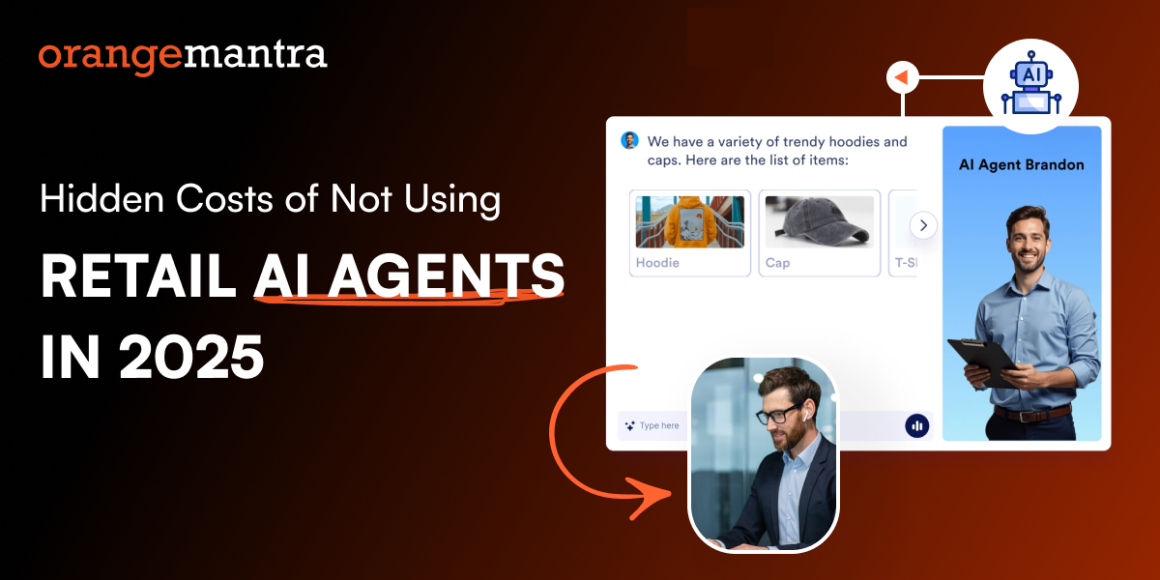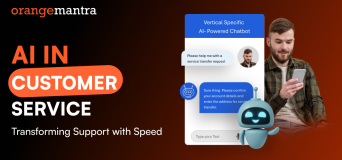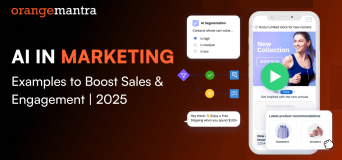In 2025, customers expect more than just good products – they expect instant, personalized, and consistent experiences. Customers want to feel understood and supported whether shopping online on mobile or in-store.
Still many retailers are relying on outdated systems and human-only workflows. This results in gaps in service and sales. In this blog, we reveal the hidden costs retailers face when they don’t use AI agents.
If you’re wondering how to stay relevant, increase efficiency, and grow revenue in a saturated retail market, retail AI agents are the answers. Read on.
What Are AI Agents in Retail?
AI agents are intelligent digital assistants designed to autonomously handle tasks, answer customer queries, and support operations. Think of them as next gen chatbots, only smarter and more capable.
AI agents:
- Understand context and learn over time
- Make decisions based on real-time data
- Integrate with your ecommerce, CRM, and inventory systems
- Work across platforms: website, mobile app, and even in-store kiosks
The best AI agents for ecommerce are said to be those which provide customer service, product recommendations, order tracking, returns, and even internal workflows.
The Hidden Costs of Not Using Retail AI Agents
Let’s explore the real cost that often goes invisible over time when AI agents are missing from your retail strategy.
Lost Sales from Poor Customer Support
Retail customers today want answers immediately. If your business isn’t available 24/7or can’t respond in under 30 seconds – you risk losing them to competitors who can.
If you don’t have retail and ecommerce AI agent:
- Live chat teams are overloaded or unavailable after hours
- Queries about products, shipping, or returns go unanswered
- Cart abandonment increases due to lack of assistance
We are assuming as a business owner, you don’t want to see lost conversions and damaged brand trust because of this.
That’s why AI agents in business are important. Your customers will get instant help whether it’s finding the right size, understanding delivery timelines, or getting help during checkout.
High Operational Costs
If you are running a retail business without automation, it means you need heavy staffing needs for repetitive tasks like:
- Answering the same FAQs
- Updating customers on order status
- Processing returns or cancellations
These tasks drain your team’s time and your budget. That’s why it is important to choose the right AI Agent for enterprise success.

Source: Salesforce
But with AI agent for ecommerce:
- Overhead drops as agents handle thousands of conversations daily
- Human teams can focus on high-value, complex issues
- You scale support without increasing headcount
Inefficient Personalization
Generic shopping experiences no longer cut it. Without AI agents for ecommerce, your store may:
- Show the same products to every visitor
- Miss chances to upsell or cross-sell based on user behavior
- Deliver irrelevant email campaigns or pop-ups
Personalized experiences can boost sales by 20% or more, but only if done right.
AI agents in retail and ecommerce analyze browsing history, purchase behavior, and preferences to:
- Recommend the right product at the right time
- Offer smart bundles based on past purchases
- Tailor experiences across channels in real-time
In short and simple words, AI agents in retail do what no static system can.
Missed Omnichannel Opportunities
Your customers don’t think in terms of channels. They browse on mobile, ask questions on WhatsApp, and buy from a desktop or vice versa.
If you are not using AI agents in retail and ecommerce:
- Customer data stays siloed
- Conversations don’t transfer between platforms
- You deliver inconsistent and frustrating experiences
But if you make wise usage of AI agents in retail, this unified experience leads to higher loyalty and lifetime value. AI agents provide omnichannel support by connecting data and interactions across:
- Ecommerce platforms
- Social media DMs
- Mobile apps
- In-store digital touchpoints
The Competitive Advantage of Adopting Retail AI Agents in 2025
In 2025, businesses that delay retail automation with AI agents risk not only losing sales but also damaging customer trust and experience. Retailers who implement AI agents for ecommerce early are already seeing:
- 30–40% savings in operational costs
- Reduced cart abandonment rates
- Higher NPS (Net Promoter Scores)
- Improved employee satisfaction due to less repetitive work
You can understand this more clearly with the help of a case study of our client (under NDA):
An online fashion retailer integrated our custom AI agents for customer support and product recommendations. Within 6 months, they reduced support tickets by 42% and increased average order value by 18% without hiring additional staff.
How to Get Started with AI Agents in Retail?
You don’t need to overhaul your entire system to start benefiting from AI agents. Here’s a simple path:
Step 1: Identify Use Cases
Start with 1-2 areas like customer support, product discovery, or returns.
Step 2: Set a Budget
You should also decide on a cost range for your AI agent development. If you want to learn the best practices for AI agent cost savings for retailers, feel free to contact us.
Step 3: Choose the Right AI Agent Platform
Look for solutions that integrate with your ecommerce stack and CRM. If you have no technical expertise, you can partner with a custom AI agent development company.
Step 4: Customize & Train
If you are working with experts who provide top AI agent development services; tell them what customization you want. They will train your retail AI agent on your catalog, tone, and brand workflows.
Step 5: Monitor & Improve
Developing an AI agent for retail is not the end. Use analytics to track performance, iterate, and improve continuously.
Conclusion
The question isn’t “Should we use AI agents in retail?” It’s “How much are we losing by not using them?”
From lost sales and high support costs to missed personalization and poor omnichannel experiences – the hidden costs add up quickly. Do not think of AI agents as a future investment; they’re a present necessity.
Ready to See AI Agents in Action?
Let’s talk about how we can build AI agents tailored to your retail business. Whether you’re running an ecommerce store or a multi-channel retail brand, we’ll help you automate support, personalize shopping, and boost revenue.
Book a Free Consultation
FAQs
Q1. What’s the difference between AI agents and chatbots in retail?
Chatbots follow pre-set scripts and often fail in complex situations. But AI agents use machine learning to understand context, personalize responses, and make decisions in real-time. They offer deeper support across customer service, sales, and operations.
Q2. How can AI agents help reduce operational costs for retailers?
Retail AI agents automate repetitive tasks like answering FAQs, tracking orders, and handling returns. They give businesses support to handle more customers without hiring additional staff. This results in lower payroll costs and higher efficiency.
Q3. Do I need to replace my existing systems to use AI agents?
No. Most AI agents are designed to integrate with your current ecommerce platforms, CRM, and helpdesk tools. You can start small with one use case and expand gradually without disrupting your operations.
Q4. How fast can I see results after implementing AI agents?
It is hard to mention the exact time. But retailers often start seeing measurable results within the first 4–8 weeks of AI agent deployment. It also depends on scale and customization.
Q5. Are AI agents only for large retail businesses?
Not at all. AI agents can be tailored for small to mid-sized ecommerce stores as well. With scalable pricing and customizable workflows, even startups can benefit from AI agents without big investments.























